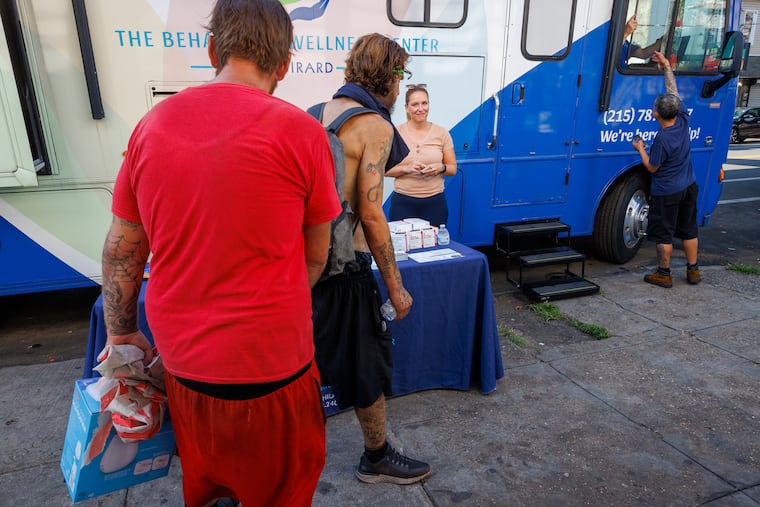Philly will consider restricting mobile addiction services from parts of Kensington
A second bill, introduced Thursday by Councilmember Quetcy Lozada, would require mobile service providers to “remove all litter” within a 50-foot radius of where they are parked.

Philadelphia lawmakers will consider legislation that could curtail mobile health-service providers that treat people who use drugs by tightening regulations on where and how they operate in Kensington.
City Councilmember Quetcy Lozada, whose district includes the site of the largest open-air drug market in the city, introduced two pieces of legislation Thursday that aim to restrict the mobile units, which are typically vans staffed by medical professionals or volunteers who provide food and medical services like wound care, from operating in parts of Kensington.
It’s the latest in a series of legislative efforts to change conditions in Kensington, where Mayor Cherelle L. Parker has also promised a crackdown on open drug use. Lozada said her office is responding to concerns from residents who say mobile units attract nuisance crime and leave behind a mess of litter. But some advocates said the bills could push mobile providers out of the neighborhood and cut off people in addiction from the services they offer.
One bill would ban mobile units from operating in residential areas — defined as blocks where more than 80% of buildings are residential and less than 50% have commercial establishments — or on any block that has a school or city recreation center on it.
The second requires mobile service providers to remove all litter within a 50-foot radius of where they are parked before leaving the area. The legislation says those who violate the new code would be liable for “all costs incurred by the city for cleanup.”
» READ MORE: Does Philly have enough addiction treatment beds? City Council seeks clarity in Kensington.
Complicating matters, both pieces of legislation would apply only to Lozada’s 7th District, which includes parts of Kensington, as well as Juniata Park, Frankford, Fairhill, Harrowgate, and Northwood. Mobile unit operators could avoid the proposed regulations if they moved south into Councilmember Mark Squilla’s 1st District or northeast into Councilmember Mike Driscoll’s 6th District.
Lozada said her colleagues are “looking at what the possibilities are for their districts.”
She said her goal is not to reduce the number of mobile units in the neighborhood, but to ensure the services they’re offering aren’t duplicative and to improve relationships between providers.
“They have even fought with each other to park in a specific location or about what time they’re going to be at a particularly location,” Lozada said. “This is an effort to really continue to allow mobile services that are necessary, but in a way that doesn’t interfere and impact quality of life.”
Some advocates said they worried the legislation could burden providers and push them out of Kensington.
Sarah Laurel, executive director of the group Savage Sisters, said her organization planned to go mobile after their landlord opted to end their storefront lease last year. She said if providers move away from Kensington, it would cut off drug users from essential services and “cost lives.”
Advocates acknowledged that some outreach groups who frequent Kensington leave messes behind. Nicole Bixler, cofounder and executive director of Operation in My Backyard, said her organization that provides harm-reduction supplies and warm meals from a van often cleans up a two-block radius around where they park.
But she also feared the bill could squeeze service providers by limiting where they can operate.
”I don’t know what the purpose of this is except to get rid of all services that are supporting public health,” Bixler said. “I feel like they’re just throwing spaghetti at the wall trying to make it stick.”
Mobile service providers are generally run by behavioral health organizations. The city itself has also invested in mobile units that provide a variety of services, including wound care, to people in need in Kensington.
Former Mayor Jim Kenney’s administration last year earmarked funding — derived from lawsuit settlements against pharmaceutical companies — for vans to provide people access to methadone, the drug used to treat opioid addiction.